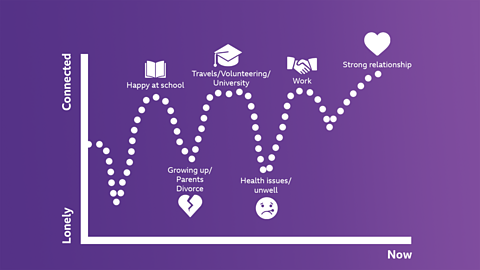If someone asked you if you had ever felt lonely, would you answer тYeah, of courseт, or would you feel ashamed or embarrassed?
There is still a lot of stigma associated with saying that weтre experiencing loneliness, but not speaking up can make us feel even more isolated.
Hopefully I can help start the conversation by telling you that, absolutely, I have felt lonely many times in my life т just like everyone else.
 Image source, ТщЖЙдМХФ
Image source, ТщЖЙдМХФтKey triggersт
One particular time I felt lonely was starting at university. It was a challenging time of change and a whole new place, new lifestyle and new set of people to navigate.
On top of that, everyone was telling me how fun and amazing it would be, so I thought I was the only one not having a great time.
Research from the British Red Cross and Co-op shows significant life changes and transitions т such as finishing school and moving away from your family т are key triggers of loneliness.
Looking back, that makes a lot of sense.
 Image source, ТщЖЙдМХФ
Image source, ТщЖЙдМХФAnd loneliness is different from being alone. You could be surrounded by loads of people at a party, or be in a relationship, and yet still feel lonely. To me, loneliness means a lack of meaningful connection, which can be with yourself as well as others.
Humans are inherently social creatures and need that meaningful connection. How much of it and how we want to receive it, varies from person to person. But one thing is for sure: a lack of connection can have a negative impact on our mental health.
If you are feeling lonely, here are some things I learnt along the way that you might find helpful too.
1. Remember you're not alone in feeling lonely
Research from the British Red Cross and Co-op found that loneliness is estimated to affect one in five people across the UK.
Loneliness can affect anyone regardless of who they are. In 2018, the Office for National Statistics found 16 and 24 year olds are the most likely to report as feeling always or often lonely, and 11% of 10 to 15 year olds describe themselves as often lonely.
Remembering this simple fact can help you realise others around you must have felt this way too and encourage you to reach out for support.
2. Think about what's going on
Spending some time reflecting on why youтre feeling lonely may help you figure out ways to experience more connection with the world.
Creating a loneliness timeline like the one below can also help you identify potential triggers and patterns. You could also share it with someone you trust to open up that conversation and ask for help and explore coping strategies.
Ask a family member, a friend, your doctor or one of the charities focusing on loneliness for support.

3. Volunteer, join a group or start a new hobby
Whether itтs a football team, a book club or a volunteering group, meeting new people can give you a sense of belonging, purpose and connection. Plus, youтll have fun! All great tools to fight loneliness.
4. Nurture the relationship with yourself and others
Invest in your relationships with the people around you and aim for meaningful interactions. So, for example, instead of just texting someone, see them face to face, arrange to go out for a coffee, or a walk. Try to talk about things that matter to you or do something active together.
Donтt forget to take time to try and find out what you like and what you need to feel good day to day. Having time to connect with yourself in whatever way is meaningful to you т like writing, art, meditation or music т is so important.
5. Remember there is always a way
If you find it hard to know what to do or how to start to connect, charities like Childline have loads of advice about loneliness and isolation. If youтre under 19 you can talk to them via phone, email or online chat. The Samaritans helpline is open all day every day.
If youтre over 18, your GP may be able to refer you to a range of local, non-medical services known as тsocial prescribingт, which can be a great first step to feel more supported.
6. The small things count
Small interactions day to day with others can make all the difference to how lonely people feel. So think of anyone in your life who may need a bit of human connection and conversation or maybe just need checking in on with a cup of tea, and act on it.
Small acts of kindness can go a long way т and the best bit is that they tend to leave all parties involved feeling happier, more connected and, ultimately, healthier.
We have all felt lonely and we will all at some point in the future feel lonely again, so letтs help each other talk about it. You are never alone in your loneliness.
Letтs talk!
Stacey Dooley explains how communication skills are about more than words

Five things to learn in 2020
What better time to start learning a new skill than in the new year?

Could getting some fresh air help both you and the planet?
A look at how spending time outdoors can benefit both you and the planet.
